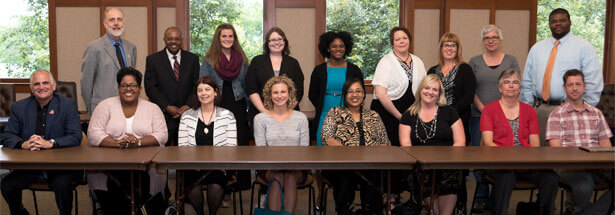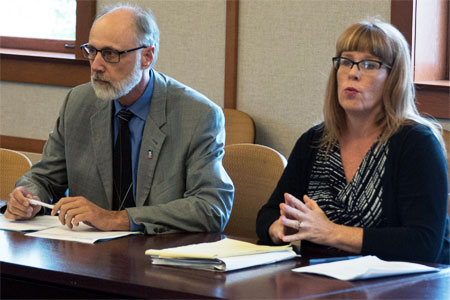
NIU President Doug Baker and Kristen Meyer, chair of the VAWA Implementation Committee, address the group’s Aug. 26 meeting.
NIU is adopting a definition of “affirmative consent” that requires anyone attempting to initiate a sexual encounter to ask for – and receive – a clear and voluntary “yes” before beginning.
Its implementation prohibits sexual activity that does not involve the affirmative consent of each individual. Moreover, NIU’s definition holds that consenters can withdraw their initial “yes” responses at any time if they choose to stop.
The university’s action to reduce incidence of sexual assault moves beyond the familiar and national “No Means No” messages of years past by removing the lack of a “no” – for whatever reason – as an unspoken implication of consent.
Officially approved by President Doug Baker and effective immediately, the carefully worded and comprehensive definition comes after two years of discussions and work by members of NIU’s Violence Against Women Act Task Force and the subsequent VAWA Implementation Committee.
A number of actions will also be forthcoming as a result of the work of these committees, including a mandatory Campus Climate Survey that will measure attitudes, beliefs, experiences and fears regarding sexual assault; and required VAWA training for all employees.
The Office of the Title IX Coordinator has produced a new brochure that lists the university and community resources available to support NIU students, faculty and staff who experience sexual misconduct, and there are efforts under way to establish a comprehensive website that will provide resources and guidance to survivors of sexual assault.
NIU also will encourage faculty members to include a statement in their syllabi regarding the range of confidential resources available to students who experience sexual assault, dating violence and other stressful incidents that can negatively impact their ability to participate in the university learning environment.
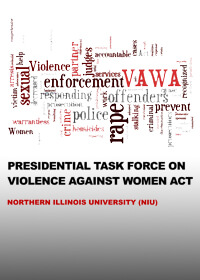 Kristen Myers, chair of the VAWA Task Force and director of the NIU Center for the Study of Women, Gender and Sexuality, calls NIU’s move to affirmative consent “proactive” and “progressive.”
Kristen Myers, chair of the VAWA Task Force and director of the NIU Center for the Study of Women, Gender and Sexuality, calls NIU’s move to affirmative consent “proactive” and “progressive.”
“The person who’s accused can’t say, ‘I didn’t understand what she meant when she said no. She never told me yes, but I went ahead and did it anyway,’ ” said Myers, who is also a Presidential Teaching Professor in the Department of Sociology.
“Affirmative consent is not the norm across the country, but it’s the way we think things are headed. There’s research into the limitations of the traditional definition of consent, which can often be used to help perpetrators avoid getting in trouble and to blame the victim,” Myers added. “I think this will be clearer for both parties, and any possibility of a blurry misunderstanding will be decreased. People will have to talk more, but it will lead to more of an agreement.”
Executive Vice President and Provost Lisa Freeman is calling on all members of the NIU community – students, administrators, faculty, staff and friends of the university – to work together in support of a safe and respectful environment free of harassment, discrimination and sexual misconduct.
“We must make it clear that all acts of sexual misconduct, from sexual violence to gender- and sex-based harassment are unacceptable. We must emphasize that sexual assault is never the fault of the victim,” Freeman said.
“Moreover, we must have the courage to use explicit language and images to communicate accurately and effectively about the importance of consent in sexual encounters,” Freeman added, “and about the factors that can impact ‘acknowledged’ versus ‘unacknowledged’ sexual assault among college students.”
NIU’s DEFINITION OF CONSENT
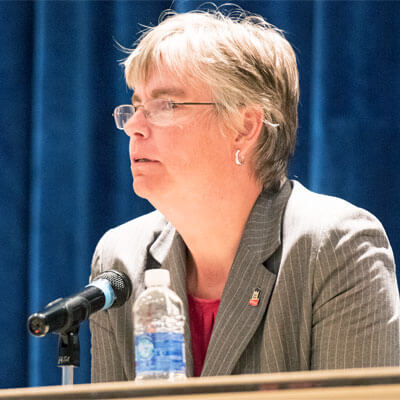
Jeanne Meyer, director of the NIU Office of Community Standards & Student Conduct, speaks during the Sept. 2 panel discussion on “The Hunting Ground.”
Consent is a clear, unambiguous, informed and voluntary agreement between all participants to knowingly engage in sexual activity. Consent must be mutually understandable by words or actions (i.e. a reasonable person would consider the words or actions to indicate mutual agreement to engage in the sexual activity). Consent is active, and cannot be based on the absence of an affirmative statement or act of denial. Silence or lack of resistance does not constitute consent.
Seeking and receiving consent is the responsibility of the person(s) initiating the sexual act or acts regardless of whether the person initiating the act is under the influence of drugs and/or alcohol.
Consent to any sexual act or prior consensual sexual activity between or with any party does not in and of itself constitute consent to any other sexual act.
Consent may be initially given, but withdrawn at any time. Consent cannot be given when a person is incapacitated (including, but not limited to, a person or someone with a physical or mental disability and/or level of intoxication that causes impairment resulting in incapacitation. Consent cannot be given when it is the result of coercion, intimidation, force or threat of harm. The University prohibits any sexual activity that does not involve the consent of each individual.
Consent must be given to engage in the act of sexual activity, and consent should also be given to any person who records or photographs any aspect of the sexual encounter as well as third parties who wish to view the sexual activity either in person or via any electronic equipment, methods or devices. Any of these acts will be deemed to be sexual exploitation. Sexual exploitation includes, but is not limited to, the following acts:
- Sexual voyeurism or allowing others to witness or observe the sexual or intimate activity of another person without that person’s full knowledge and consent;
- Indecent or lewd exposure or inducing another person to expose themselves when consent is not present;
- Recording any person engaged in sexual or intimate activity in a private space without that person’s full knowledge and consent, even if the person recording the sexual or intimate activity is also engaged in the consented to sexual activity;
- Distributing sexual or intimate information, images or recordings about another person without that person’s full knowledge and consent;
- Recruiting, harboring, transporting, providing, or obtaining another person for the purpose of sexual exploitation;
- Inducing incapacitation in another person with the intent to engage in sexual conduct, regardless of whether prohibited sexual conduct actually occurs.
The definition of consent does not vary based upon a participant’s sex, sexual orientation, gender identity or gender expression.
WHAT DOES IT MEAN?
Affirmative consent is “different from ‘No Means No,’ where the absence of saying anything could be taken as a ‘yes,’ ” Myers said.
“Before this, a ‘no’ could be interpreted in all different kinds of ways – if she didn’t push him off; if she didn’t say the word ‘no,’ then she didn’t really mean it; if she was intoxicated, which alone violates the definition of affirmative consent,” Myers said. “With affirmative consent, you actually have to say the word ‘yes.’ Yes means yes, and it’s ‘yes’ until you say ‘no.’ ”
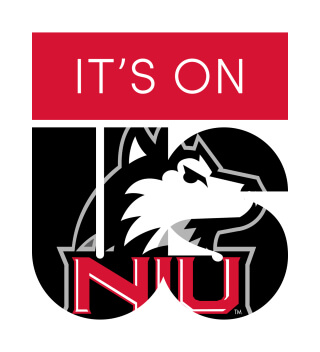 California led the way, she said.
California led the way, she said.
Senate Bill No. 967, approved by both houses in the summer of 2014 and signed into law last September, was the nation’s first legislation mandating affirmative consent policies at post-secondary educational institutions.
NIU is well in step with the movement, Myers said.
This semester began with mandatory Haven training for new students; the online module covered the ethics of relationships, the effects of alcohol on relationships, the ability to give consent and bystander intervention.
A Sept. 2 screening of the documentary “The Hunting Ground,” along with a panel discussion on sexual assault, offered more education and conversation.
A conference titled “Creating a Safer Campus: Supporting Survivors and Removing Barriers-Part 1” is scheduled for 2 p.m. Friday, Oct. 16, in the Chandelier Room of Adams Hall. This conference, sponsored by the Presidential Commission on the Status of Women, will focus on advocacy and support for survivors of sexual assault. The commission plans a follow-up event focused more directly on Title IX during the spring semester.
Last fall, the Student Association organized a week of action activities in conjunction with the White House-led “It’s On Us” crusade, which advocates for students’ awareness of campus sexual assaults. NIU Student Trustee Raquel Chavez, then vice president of the SA, played the key role.
Current students are promoting a “Huskies Get Consent” campaign and social media hashtag, working to create marketing materials that are simple, transparent and worded in language that students use and understand.
WHAT COMES NEXT
While many students already understand the rules of healthy relationships, Myers said she and her colleagues on the VAWA Implementation Committee realize that NIU – and U.S. society itself – must undergo “a culture shift.”
“We just don’t have a culture yet that says, ‘This is not OK,’ ” she said.
“People have to know the information. They have to hold each other accountable, and that can’t just come from rules, as Dr. Baker has said. People’s behavior will change through culture, but it also will change through people being held accountable,” she added. “To truly change, everyone has to be involved. We need to make it so that it’s unthinkable to assault someone.”
Myers, who envisions a culture that is inviting, affirming, inclusive and safe, is confident that day will come.
“Compliance is not just about rules but the social side as well. You can affect what people think is OK and what people think is not OK,” she said.
“People used to be completely empowered to make sexist, racist and homophobic comments aloud in the professional workplace. They can no longer do that due to changes in harassment laws. Those laws accompanied a culture shift, and now it would be outrageous to hear someone do that in most workplaces. People would not tolerate it.”
Findings of the Campus Climate Survey will fuel some of those influencers.
Data collection will show how students perceive the beliefs of their peers regarding relationships and sexual tactics as well as how they perceive their own beliefs in those areas. It also will measure how many students are sexually active, how they adhere to the notion of “consent” and their possible experience with sexual harassment.
The survey also asks detailed questions of victims and perpetrators of sexual violence, dating violence and stalking that, through anonymity, strive to paint a better picture of current conditions.
Sexual assault is vastly underreported in the United States, Myers said.
At the same time, “there’s also a lot of misperception of false claims of sexual assault. The public perception is that 50 percent are false, and that’s not true. It’s only between 5 and 10 percent, depending on what study you read, and is about the same rate of false reporting associated with other crimes,” she added. “And because people believe so many of these claims are false – when they’re not – people tend to lean toward the accused.”
Members of the Implementation Committee, who began their work in April, also are advocating for the university to appoint someone to oversee ongoing coordination of VAWA efforts and compliance.
